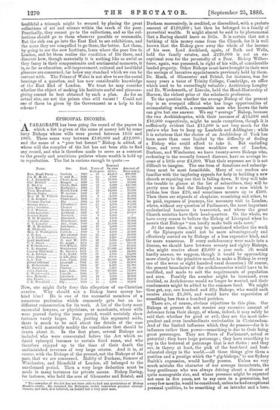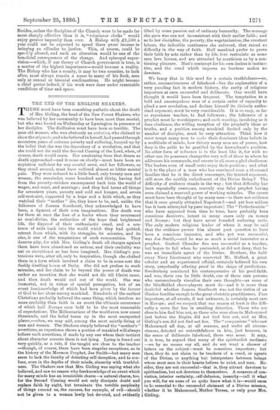EPISCOPAL INCOMES.
APARAGRAPH has been going the round of the papers in which a list is given of the sums of money left by some forty Bishops whose wills were proved between 1856 and 1885. These sums vary between £140,000 and £12,000; and the name of a "poor but honest" Bishop is added, of whose will the compiler of the list has not been able to find any record, and who is therefore made to serve as a contrast to the greedy and avaricious prelates whose wealth is held up to reprobation. The list is curious enough to quote :-
Nominal
Name. See. Died. Years of Income Bishopric. of Ses. Amount of Personalty.
Hon. Hugh Percy Carlisle ... 1855 ... ... £4,580 ... £90,000 Jas. H. Monk G and B.... 1856 5.000 ... 140,000 C. J. Blomfield Chest.,Lon. 1857 10.000 ...
60,00)
Chr. Bethel'. Bangor ... 1859 ... 35 4.000 ... 20,000 N. Ma.41 y Chich.,Dmr. 1859 8,000 ... 120.000 Geo. Murray Rochester.. 1860 ... 47 5,000 ... 60,0J) Thos. Musgrave Heref.York 160 10,000 ... 70.000 Henry reins W. 'Pester.. 1860 5 000
Hon H. IL Villiers Durham ... 1861 8,000 ... 28,000 J. B. Sumner Cbest.Cant. 1862 ... 31 15,000
Thomas Tinton Ely 1864 ... 19 5,500 40,000 George Davys Pet erbor.i. 1864 ... 25 4,580 80,000 John Graham Chester ... 1865 ... 17 4,500 18100 J. C. Wigram Rochester. 1867 5,000 45,001 John Lonsdale ..... Lichfield... 1867 ... 24 4,000 90,000 Samuel Hinds Norwich ... 1863 4,500
R. D. Hampden Hereford... 1868 ... 20 4,590 . -
45,000
Francis Jenne Peterboro'. 1868 4.500 35,000 C. T. Longley Rio., Cant. 1868 15,000 45,000 W. N. Hamilton Salisbury... 1869 ... 16 5,000 14,000 H. Philpotts Exeter 1869 5,000 60,000 Hon. S. Waldegrave CarliFle 1869 4,500 20,000
Mapehester 1860 ... 21 4,200 40,000 A. T. Gilbert Chichester. 1870 ... 28 4,200 12.000 Lord Auckland B and W. 1870 5,000 120,000 T. V. Short St. Asaph... 1872 4,200 14,010 S. Wilberforce Oxf.,Winch. 1873 7,000 60,000 C. R. Sumner Winchester 1874 10,000 80.060 Connop Thirlwall St. Davin's 1875 ... 34 4,500 16,000
G. A. Selwyn
N Z., Licht. 1878 ... 37 4,500 16,000 Chas. Baring GAS., Our. 1879 8.000 120,000 A. C. Tait Lou., Cant. 1882 ... 26 15,000 35,000 Alfred 011ivant Llandaff ... 18E2 4,200 30,000 R. Biekersteth Ripon 1884 4,500 25,000 W. Jacobson Chester 1884 ... 19 4,503
435,030
John Jackson Line, Lon.. 1885 10,000 72.000 C. Wordsviorth Lincoln 1885 ... 17 5,000 85,000 Geo. Moberly Salisbury ... 1885 ... 16 5,000 29,000 Jas. Fraser Manchester. 1815 ... 15 4,200 85,000 J. R. Woodford Ely 1885 ... 12 5,500 19,000
Now, one might flatly deny this allegation of un-Christian avarice. Why should not a Bishop leave money be- hind him ? He is one of the successful members of a numerous .profession which commonly gets but an in- different remuneration for its work. A list of the forty most succeesful lawyers, or physicians, or merchants, whose wills were proved daring the same period, would certainly show fortunes vastly larger. But, putting this argument aside, there is much to be said about the details of the case which will materially modify the conclusions that should be drawn about it. In the first place, several Bishops are included who were consecrated before the Act which re- duced episcopal incomes to certain fixed sums, and who therefore enjoyed up to the time of their death the undiminished revenues of very large estates. And it is, of course, with the Bishops of the present, not the Bishops of the past, that we are concerned. Maltby of Durham, Sumner of Winchester, and Blomfield of London, all belonged to the unreformed period. Then a very large deduction must be made in many instances for private means. Bishop Baring, for instance, who held the sees of Gloucester and Bristol, and
• The compiler of the list has not been able to find any particulars of Bishop Hinds'a estate. He resigned his Bishopric under somewhat peculiar circum- stances, and died, it is believed, an honest but a very poor man.
Durham successively, is credited, or discredited, with a probate amount of £120,000 ; but then he belonged to a family of proverbial wealth. It might almost be said to be phenomenal that a Baring should leave so little. It is certain that not a farthing of this money came from the Church, for it is well known that the Bishop gave away the whole of the income of his sees. Lord Auckland, again, of Bath and Wells, held the family estates, and £120,000 is not an ex- ceptional sum for the personalty of a Peer. Bishop Wilber- force, again, was possessed, in right of his wife, of censiderable landed property. Other Bishops must have brought to their sees the savings of lucrative appointments previously held by them. Dr. Monk, of Gloucester and Bristol, for instance, was for many years a tutor of Trinity College, Cambridge, an office which used to be exceedingly valuable ; Archbishop Longley and Dr. Wordsworth, of Lincoln, held the Head-Mastership of Harrow, the richest prize of the scholastic profession.
To the question whether the average Bishop of the present day is an overpaid official who has large opportunities of accumulating wealth, a reasonable man who knows the facts can give but one answer. We say " average " Bishop, because the two Archbishoprics, with their incomes of .215,000 and £10,000 respectively, might be made exceptions, though it is sufficiently evident that £15,000 is not very much for the prelate who has to keep up Lambeth and Addington ; while it is notorious that the choice of an Archbishop of York has been more than once limited by the difficulty of finding a Bishop who could afford to take it. But excluding these, and even the three wealthier sees of London, Durham, and Winchester, we have twenty-seven Bishops who, reckoning in the recently formed dioceses, have an average in- come of a little over £4,000. What their expenses are it is not difficult to imagine. The one item of donations and subscrip- tions must be most formidable. Many of our readers are familiar with the imploring appeals for help in building a new church or repairing one that is falling down. If they will take the trouble to glance at the list of subscribers, they will be pretty sure to find the Bishop's name for a sum which is seldom less than £20, and sometimes mounts up to £100. Then there are stipends of chaplains, examining and other, to be paid, expenses of journeys, the necessary visit to London, where, without any question of Parliament, the most important ecclesiastical business is transacted, and where the great Church societies have their head-quarters. On the whole, we have every reason to believe the Bishop of Liverpool when be asserts that Bishops "can hardly make both ends meet."
At the same time, it may be questioned whether the work of the Episcopate could not be more advantageously and effectively carried on by Bishops of a less expensive kind, and far more numerous. If every archdeaconry were made into a diocese, we should have between seventy and eighty Bishops, who might receive about £2,000 a year each. (It would hardly answer, we suppose, though it would be approaching more closely to the primitive model, to make a Bishop in every one of the seven or eight hundred rural deaneries.) Of coarse, the present boundaries of the archdeaconries would have to be modified, and made to suit the requirements of population and area. Possibly the number might be increased, even doubled, as Archdeacons would no longer be wanted, and their emoluments might be added to the common fund. We might thus get, say, one hundred and fifty Bishops, who would each receive about £1,500, and would have the supervision of something less than a hundred parishes. There are, of course, obvious objections to this plan. Our Bishops at present do not receive any excessive amount of deference from their clergy, of whom, indeed, it may safely be said that, whether for good or evil, they are the most inde- pendent and even insubordinate ecclesiastics in Christendom. And of the limited influence which they do possess-for it is influence rather than power-something is due to their being great personages. They are Peers of Parliament, actual or potential ; they have large patronage ; they have something to say in the bestowal of patronage that is not theirs ; and they are, in theory at least, the pick of the best-bred and best- educated clergy in the world,-all these things give them a position and a prestige which the "gig-bishops," to use Sydney Smith's expression, would hardly possess. Unless we very much mistake the character of our average incumbents, the busy gentleman who was always driving about a diocese of quite manageable size, and whose presence might be expected not once in five years, not to say once in a generation, but every few months, would be considered, unless he had exceptional personal qualities, to be something of an intruder and a bore. Besides, unless the discipline of the Church were to be made far more sharply effective than it is, " criminous clerks" would enjoy greater impunity than ever. A Bishop with £1,500 a year could not be expected to spend three years' income in bringing an offender to justice. This, of course, could be speedily altered, and such an alteration would be one of the beneficial consequences of the change. And episcopal super- vision—which, if our theory of Church government is true, is a matter of the highest importance—would become a reality. The Bishop who has a county, it may be two counties, to look after, must always remain a name to many of his flock, seen only at annual or biennial confirmations. He might become a chief pastor indeed, if his work were done under reasonable conditions of time and space.



































 Previous page
Previous page